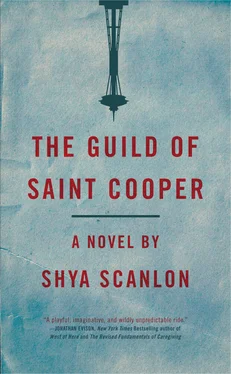Shya Scanlon
The Guild of Saint Cooper
“The imagination loses vitality as it ceases to adhere to what is real.”
— Wallace Stevens
“The more clearly one sees this world, the more one is obliged to pretend it does not exist.”
— James Salter
“I have no idea where this will lead us, but I have a definite feeling it will be a place both wonderful and strange.”
— Dale Cooper
MY BROTHER HAD LEFT, my wife had left, and Fred, the only neighbor left on the block, was packing. Even those who stayed were tired of waiting. Soon, the few stores remaining would close. The pharmacy. The grocery. Everything under a buck. What then? From my perch on the high porch I watched my mother gather blooms in the back yard. Her long white hair fell loose around her narrow shoulders, coating them with snow. It was hot. The sun smashed down on her back and on the upturned faces of the flowers and she clipped one — bright orange, many-petaled — then held her bouquet at arm’s length and nodded, turning it slowly in her hands.
“Zinnias are from Mexico,” she said, seeing me, and then, “Keep an eye out for Zane, will you? He’s delivering some marijuana today.”
As she walked to the edge of the porch and held up the bouquet, a shadow flickered across her face as a crow passed overhead. I took the flowers inside. Yesterday’s flowers, only slightly faded, still filled a vase at the center of the dining-room table, and I replaced them, then joined my mother’s masks in staring. Masks from all over the world covered the walls, staring impassively at whatever unfamiliar thing the room produced. Years ago they’d spooked me. I’d thought they were watching me, spying on me, whispering my secrets. Now I just felt bad for them, unwilling spectators at a strange and impenetrable ritual. I felt bad, and I empathized.
The emergency radio crackled like a dog eating bones, then fell silent. The whole house was silent. I stood in silence above the bouquet and stared out the window.
Across the street, Fred was lifting a large metal sculpture into the back of his van. It looked like he had it, but at the last moment his grip failed and the complicated, fragile thing crashed to his feet. He cursed loudly, and as though drawn to the noise I joined him outside. Fred had never been a very close neighbor, but with everyone else gone our bond had deepened. Since the evacuation, his once-intimidating body had grown bent with worry and suddenly with age. He leaned it against his van and rubbed its lower back with a frown.
“Damn thing,” he said.
“What’s the story?”
“Was given to me by a Russian czar for a job I did in Alaska.”
Now in pieces, the sculpture had been of a chicken with fire shooting out of its mouth. I turned over one of the small flames with my foot and it made the muffled clink of pocket change.
“Why a chicken?”
Fred quickly gathered the pieces and hoisted them into the van, his back audibly popping, his face tight.
“Dragon,” he said. He closed the van door and held out a massive, lumpy hand. “Well, I guess this is it. Give your mother my best.”
In the three seconds our hands were clasped a slimy glaze slicked my palm.
“Given,” I said.
He walked up the short, trimmed path to his steps, up his steps to the porch, and locked his front door. He tried the handle and put the key back in his pocket, then made his way back to the van.
“And please,” he said, leaning out the window, “tell your mother to keep that gas tank secret. No telling who’d do what for it.”
He gave the abandoned cars and fallen branches a wide berth on his way down the block, and paused at the end of the street with his blinker on. Then, with a small wave of his hand, he was gone.
I looked back at his house. He’d kept his property groomed, a polite rebuttal to the slow collapse around it. Looking at this house and only at this house, a person wouldn’t suspect anything had changed.
Out of respect, I decided to give it twenty-four hours before breaking in.
Unlike Fred’s place, my mother’s had fallen into semi-disrepair since my brother had taken his family east. I did what I could to keep the trees back and maintain the drainage around the foundation like he’d shown me, but I wasn’t quite up to the task, and my mother made it easy to neglect the place.
“It’ll outlive me,” she’d say with a shrug.
With the exception of her garden, neglect was a lifestyle decision at 939 NW 64th Street. It formed a bond between us. I neglected my writing like I’d neglected my wife, my mother neglected herself, and we both neglected the house.
A siren sounded from somewhere toward the water, releasing three long, true wails before twisting into something more like a wounded cat.
During the evacuation, Fred had stood watch tirelessly over his home, and by virtue of occupying his own porch had served as a kind of sentinel for the block. The rest of us were frequently woken in the night by the sound of his warning shots, but after the first week or two these became soothing rather than frightening, a sign of safety, of order.
The looting had finally ceased to be much of an issue, but I couldn’t help feeling vaguely exposed.
I went back inside.
“Zane? Zane, is that you?”
“No, Mom, it’s me,” I called through the house. “Mom?” I found my mother sitting on the back porch in the sun, her eyes closed.
“It’s me,” I said again. “Fred’s gone. He says goodbye.”
“Goodbye, Fred.”
“He says to keep the gas safe.”
She squinted up at me. “You can tell Fred that if he has any other opinions about the gas he can tell me personally.”
“I think I’m going to see if he left a television.”
We’d gotten rid of our TV over a year ago to distance ourselves from the goings-on of people whose actions, to quote my mother, “no longer concern us.” I didn’t care at the time. I’d never been a news watcher and that’s all anything was anymore: news in the form of entertainment or entertainment in the form of news. Who could tell one from the other? Who cared? So I was surprised that this had been my first response to Fred’s announcement, a week before, that he’d be leaving.
“What do you think?” I asked.
“I think it’s a beautiful day,” my mother said, and closed her eyes.
Having cheated herself out of a retirement home in Arizona, it simply couldn’t get too hot for my mother. I watched a fat, dizzy bee meander across the deck and rise willfully upward, making for an apple blossom.
“I’m going to try and get some writing done,” I said.
I had not been writing.
The book I’d been working on when Seattle evacuated was pure fantasia, a baroque love affair with sound and rhythm and nonsense. But compared to the surrealism around me, it had begun to seem indulgent, and worse, beside the point. I climbed the stairs to my writing room and looked out over lower Ballard, Fremont, and the north side of Queen Anne Hill. What followed had been a period of simply writing down things I saw with no real coherent structure, let alone plot. I’d recorded the big events: the massive exodus, the rise of homesteaders. I’d recorded my responses to the slow collapse around me, the gradual normalization of everything new, the emotional flatlining in the face of Munch-level loneliness, existential dread, and psychic displacement.
I’d then begun to record the weather.
The Space Needle, long since decommissioned, pointlessly hovered in the distance. Closer, gulls circled over the Fremont canal, their bodies sagging below habitual wings. From this view the city remained largely unchanged, pre-apocalyptic. If anything, more serene.
Читать дальше












